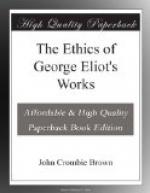There now only remains the last yet published, and in the estimation of many, the greatest, of George Eliot’s works—’Daniel Deronda.’ In it the author takes up—not a new scope, but extends one that has all along been present, and that indeed was inevitably associated with her great ethical principle,—the bringing of that principle definitely and directly to bear upon not only every domestic but every social and political relation of human life. This tendency may be briefly expressed in the old and profound words: “No man liveth to himself; no man dieth to himself.” As we aim toward the true and good and pure, or surrender ourselves the slaves of self and sense, we live or die to God or to the devil.
Before, however, proceeding to detailed examination of this remarkable work, it seems necessary to draw attention to one objection which has been urged against it—the prominent introduction of the Jewish element into its scheme. Such objection could scarcely have been put forward by any one who considers what the Jew has been in the past—what an enormous factor his past and present have been and are, in the development and progress of our highest civilisation. Historically, we first meet him coming forth from the Arabian desert, a rude unlettered herdsman, in intelligence, cultivation, and morality far below the tribes among whom he is thrown. A terrible weapon arms him—a theism stern, hard, and pitiless, beyond, perhaps, all the world has ever seen. To the bravest and best of his race—a Moses and a Joshua, a Deborah and a Jephtha—this presents ruthless massacre, the vilest treachery, offering up a sacrifice the dearest and most loved, not as mere permissible acts, but as deeds of religious homage solemnly enjoined by his Most High. This theism has one central thought in which it practically stands alone, and which it was the aim of all its supposed heads and legislators to keep inviolate amid all surrounding antagonisms—the intense assertion of the Divine unity. “Hear, O Israel! the Lord thy God is one Lord.” In these brief words lies the very core of Judaism. So long as he holds fast by this central truth, the Jew is exhibited to us as practically omnipotent. Seas and floods divide before him; hosts numberless as the sands are scattered at his appearance; cyclopean walls fall prone at his trumpet-blast.




